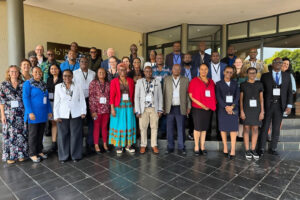According to various 2021 university ranking systems such as Times Higher Education Index, Unirank, Scimago, and Nature Index, the University of Namibia is the top-ranked university in Namibia, and part of the top 100 in Africa.
These rankings, published just a month ago, are a key indicator of UNAM’s significant contributions towards the development of knowledge and society through conducting quality research with societal impact. It also indicates the tally of academic research published in indexed journals.
The 2021 Nature Index shows UNAM as number one in Namibia and 84th in Africa, out of 290 universities. This listing, according to ‘Nature, (one of the top publishing outlets for scientific research) , is based on an institution’s or country’s publication output in 82 natural-science journals, selected on the reputation by an independent panel of leading scientists in their fields.
UniRank, an international higher education ranking directory and search engine, which was referenced for evaluation of universities in the Harambee Prosperity Plan, ranked UNAM as the top university in Namibia and 24th in Africa respectively.
According to Scimago Institutions Rankings (SIR), which serves as a reliable ranking system for universities and other research institutions, UNAM is ranked first in Namibia, 74th in Africa and 784th in global rankings. The Namibia University of Science and Technology ), has a global rank of 863rd and occupies the last position in Africa at 120th. The International University of Management (IUM) was unranked.
On this ranking system, UNAM is well ahead of similarly sized universities in Southern Africa such as the University of Mauritius, University of Botswana, Nelson Mandela Metropolitan University, and the Cape Peninsula University of Technology. SIR is based on a weighted performance in a combination of indicators that include research performance (50%), innovation outputs (30%), and societal impact as measured by web visibility from the institution’s website and mentions from social networks (20%).
The SIR rankings are an attestation to UNAM’s position as a leading institution. Despite the 2020 knock from the COVID-19 pandemic, which negatively impacted the university’s overall standing in Africa and globally. UNAM’s academics took to publishing during the lockdown and increased their research outputs. This resulted in an improved research ranking.
UNAM is the only Namibian university that is listed in the Times Higher Education Index (THE) and is captured under reporter status. The THE Index is considered one of the most authoritative indexes capturing only universities with more than 1000 publications listed in SCOPUS over the past 5 years. Mainly because there are over 30,000 universities in the world according to webometrics and only 1600 are ranked on THE index and an additional 450 are captured under reporter status. This makes UNAM a member of an exclusive club of 10% of the world’s Universities.
The Webometrics ranking system places NUST higher than UNAM. This system mainly measures web metrics such as website traffic and web visibility.
Professor Anicia Peters, Pro-Vice-Chancellor for research, innovation, and development explained that: “University rankings are becoming an increasingly important reflection of the University’s national, regional and international standing and competitiveness and are unbiased and independent”. She further mentioned that research is a leading measurement in the University’s ranking system and that UNAM strives to be part of the top 10 universities in Africa and top 500 globally by consistently publishing 1000 peer-reviewed SCOPUS-listed articles per year by the year 2030.
In 2019, UNAM had a total of 208 publications in SCOPUS which increased to 295 in 2020, and a target of 400 has been set for 2021. This target will increase annually. UNAM is on its way to achieving its vision: “To be a sustainable international hub of excellence in higher education, training, research and innovation by 2030”, she said.
Authors: Prof Davis Mumbengegwi, Prof Anicia Peters, Mr Kelvin Katukula, Prof Ahmad Cheikhyoussef, Prof Michael Backes





